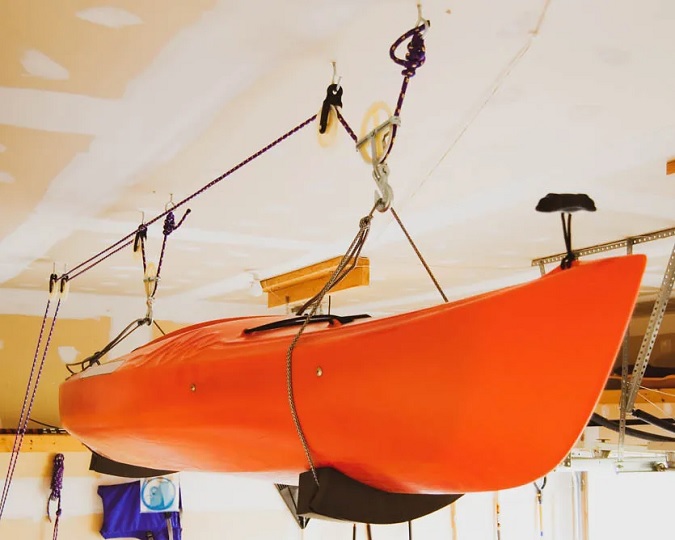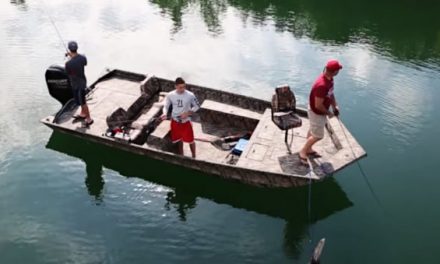
Imagine your disappointment when you go out on an adventure with your kayak only to discover cracks in the foundation or total material distortion. The prospect of purchasing another or performing repairs may weigh you down when you want to go out and have some fun.
By storing your kayak inside, you can avoid all of these regrets. I’ll explain why indoor storage is the best option for your kayak, as well as the best practices for doing so.
Three major advantages of storing kayaks indoors
Protect your kayak from weather elements
Regardless of the materials used, kayaks can deteriorate when exposed to the elements. As a result, it is recommended that you store your vessel inside to protect it from the sun, heat, rain, wind, cold, and frost. The following are some examples of how the elements can harm your kayak:
Sunlight
The kayak is exposed to harmful UV rays from the sun, which can cause fading and damage to some materials over time. Keep your kayak out of the sun’s path, even if you store it inside. Cover the windows or make sure the storage area is completely out of direct sunlight.
Rain and snow
Rain and snow expose the kayak to moisture, which leads to mold and fungus growth, as well as warping or degradation of the kayak’s materials over time. Storing a kayak inside helps prevent exposure, but if you live in a humid climate, you should use a dehumidifier. Again, always thoroughly dry the kayak before storing it.
Heat
Over time, heat can distort your kayak. Indoor storage allows you to control the temperature inside during hotter or colder months, avoiding extreme temperatures.
Cold and frost
Even though the cold is the least of your concerns, you should keep the kayak inside in a climate-controlled environment during the winter months. The kayak will be harmed by repeated freezing and thawing, so keep the storage temperature above 32°F.
Protect your kayak from being stolen
Kayaking is a significant financial, adventure, and recreational investment. Outdoor storage exposes the kayak to theft, which can be avoided by storing it indoors. Keep your boat in a secure location that only you and those you trust have access to.
If locking your kayak isn’t an option, store it in a hidden location. Thieves aren’t interested in wasting time looking for something they can’t see. It is difficult to reach it if it is kept in an inconspicuous location, which deters theft.
To make your kayak even more secure against theft, consider using a locking cable. It would be difficult for the thieves to move your kayak if they happened to find it.
Makes sure you and your loved ones are safe
One way to keep your kayak out of the way for you and your family is to store it inside. This reduces the risk of an accident, especially if stored properly indoors. To avoid falling and injuring your loved ones, do not lean it against a wall. Keep it in a garage or a room where children cannot easily access it. You will need a kayak wall mount for this to keep your kayak secure and out of harm’s way.
Best practices for storing your kayak indoors
Keeping a kayak inside does not imply bringing it inside and leaving it on the floor. To reap the benefits of indoor storage, follow the best practices for kayak storage outlined below:
- Do not store the kayak cockpit upright because it is not designed to sit on the hull for an extended period of time. It has the potential to dent or deform the hull.
- When storing your kayak, remove the kayak cart. If you don’t, the kayak will sag because one end will be on the ground and the other will be elevated.
- To avoid hull distortion or deformity, make sure your kayak’s weight is distributed evenly. Always ensure that the yak is evenly spaced across the suspension or mounting system.
- To avoid deforming or denting the hull, store the kayak upside down. This reduces the risk of sagging and scratching. If you don’t have enough room to store the kayak upside down, carefully store it on its side.
- Before storing your kayak, always clean both the inside and outside. To remove salt, dirt, sand, and grime, rinse it with clean water. Cleaning the kayak before storing it keeps it in good condition, extending its life.
- Avoid storing the kayak on the ground for an extended period of time because it may be exposed to freezing temperatures or moisture, both of which can damage the hull.
- Accessories such as a life jacket, spray kit, paddle, and dry bags should be stored with the same care as the kayak. Indoor storage is ideal because it protects the accessories from the elements and potential theft.
- Maintain a comfortable temperature inside the storage area for your kayak. This prevents your boat from being damaged by excessive heat or cold.
- Avoid obstructing walkways to avoid accidents that could result in injuries or damage to your kayak.
- Keep your kayak away from items that you use frequently. As you try to get around or behind it for items you need, you risk injuring yourself or damaging your vessel.
- Even if you keep your kayak indoors, consider covering it to keep animals like rodents from making a home in it.
- Always keep the kayak away from windows. If it is not possible, use window covers to protect your vessel from the sun.
- Do not hang your kayak from the back or front handles. Hanging it puts strain on the ends, which can lead to bends or deformities.
- Do not secure your kayak with tight straps as it creates pressure points that can warp the hull.
Summary
One way to extend the life of your kayak is to store it inside. It protects your vessel from the elements and theft, as well as your and your loved one’s safety. When storing the kayak indoors, however, always follow the best storage practices outlined above to get the most out of it. However, if you take the necessary precautions, you can store your kayak outside as well.
About the author Ally Mash
Bio: A world traveler and outdoor enthusiast, Ally has spent most of his free time backpacking through South America, Iceland, Vietnam, and Europe. His mission is to get more people in the mindset of protecting our planet by sharing its beauty with fellow adventurers like him on Adventures Pursuit!
The post The Best Tips For Storing Kayaks Inside appeared first on OutDoors Unlimited Media and Magazine.















